12 Reasons Why I Should Direct the Next Star Trek Movie
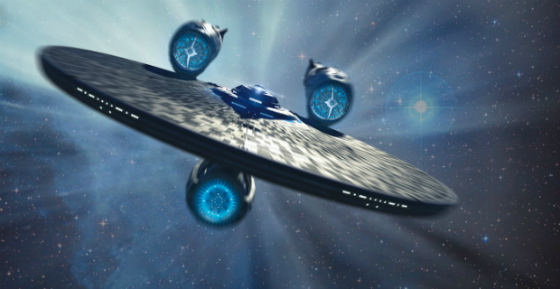 |
Dear Paramount,
In 2009, filmmaker-cum-advertising expert J.J. Abrams effectively rebooted the flagging Star Trek empire with a well-reviewed, popular, and generally well-liked feature film called, fittingly enough, Star Trek. It was a film that was fresh in all senses of the word: It was a new cast, it was an entirely new production team, it featured a new storytelling continuity, a new tone, and a new way of looking at Star Trek. I suppose something so dramatically different was needed after 11 feature films and 40 years of movies.
Due to its public buzz and financial success, a sequel was inevitable, and Star Trek Into Darkness was released in 2012. Star Trek Into Darkness is, I hold, the worst of the Star Trek movies, mainly because of its senseless screenplay, and specifically because of its exhausting insistence on exploiting Star Trek iconography; It was a film that confused the shock of pop-culture recognition with genuine drama. Star Trek Into Darkness, was, however, also a big hit, and a new Star Trek film – frustratingly nicknamed Star Trek 3 at this juncture – is currently in the Hollywood pipeline, stumbling through a small patch of Development Hell. If you’ve been following the news, you’ll know that Star Trek 3 lost J.J. Abrams to some other sci-fi franchise, and the replacement director, screenwriter Roberto Orci, has also dropped out.
Who is to take Orci’s place? We can all speculate, but I already have the perfect idea: Me. I should. I, Witney Seibold, film critic, should take Orci’s place as director of Star Trek 3.
And while it’s true that I have never directed anything more complicated than a student short film or maybe some brief theatrical dalliances here and there, and I have no practical experience in making multimillion dollar feature films for major studios, I feel that I am still uniquely qualified to dictate how the next Star Trek feature film should be made. And I’m not going to be shy, dear readers, about my qualifications. Here are 12 good reasons why Paramount should hire me. Paramount, I hope you’re listening, because you may have found the perfect helmsman for your Enterprise.
1. I Have Street Cred
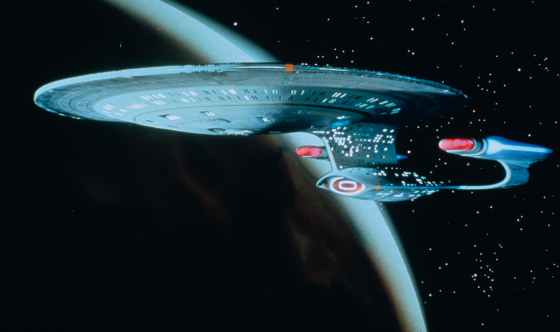 |
I’m not a geek for much these days, but I am certainly still a Trekkie, even at this late date (Yes, I even feel that “Trekkie” is the correct term, and “Trekker” a nonsense word invented by fans in denial). I started watching reruns of the original series when I but a wee lad, and obsessively followed Star Trek: The Next Generation all throughout its run. I have attended several Star Trek conventions, bought my own uniform, assembled my own models, and read numerous Star Trek tie-in novels. I wore a communicator badge on my Boy Scout uniform, even though the pin backs scratched my chest. And this was all long, long before attending conventions and “flying your geek flag” became the hip cottage industries that they are today. Yes, my friends, I was a geek before it was cool.
J.J. Abrams may have claimed to be a Trek nerd from the old days (he said he was in a few interviews), but I don’t think he was half as deep into Trek as your average fanboy. Watching Star Trek (2009), you can readily tell that this was not made by someone who was trying to recreate the material. It was someone making his own action sci-fi hybrid thing wrapped in Star Trek skin.
Not that a Star Trek feature film needs to be made by a fanboy; the best sci-fi films were not made by people who were already fans of the material. But a fanboy would – at least presumably – have a more profound understanding of the material at hand. Fanboys – especially longtime fanboys – spend more time watching and thinking about their objects of affection than the creators do. Who should direct such a beloved nerd property like Star Trek? A fanboy with street cred. And you know who has that street cred? I have that street cred.
You ever heard of the IFT? The International Federation of Trekkers? The pre-Internet organization that assigned you a ship and a rank and held monthly meetings, or corresponded through the mail? I was an ensign aboard The T’Hy’la, NFC-8406. You just got beat.
2. I’ve Seen ‘Em
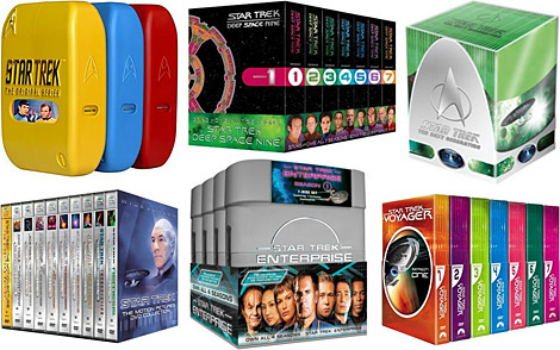 |
As of this writing, I am halfway through the fourth and final season of Star Trek: Enterprise, the most recent – and most maligned – of the six Star Trek shows. This undertaking was preceded by a marathon through all seven seasons of Star Trek: Voyager. After I’m done with Enterprise, I’ll loop around to Deep Space Nine, and see what kind of thrill it still gives me. After that, maybe I’ll revisit the animated series. I can do this because I own all of the Star Trek shows and movies on home video. Yes, every last one. I even have an old VHS copy of William Shatner’s Star Trek Memories, released back in 1991.
So I’m no mere longtime fan. I’m an active participant in all things Trek. I know the stories of the characters, the arc of the show, the timeline of events. My aging brain is not as much of a steel trap for trivia as it once was, and I may not be able to beat a sprier mind in a trivia-off, but the trivia is in there.
Again, having an intimate knowledge of the source material is perhaps not necessary for making a Star Trek feature. Indeed, many people enjoyed the approach of the 2009 film, which was to dramatize the most familiar elements of Star Trek, rather than delving into the more obscure corners of its mythology. If Abrams had made something that only referred to previous Trek episodes, it would have been oblique, pandering and horrible. Trekkies may have liked it, but it would not have been the success it was.
?
Nonetheless, knowing the source material would, I feel, lend a vague air of legitimacy to the proceedings. Trek 2009 was a big hit, but most people – even non-fans – would argue that it just doesn’t feel like Star Trek. That it was more a J.J. Abrams joint than a continuation of the series. That it was about action and not about the elements that made Star Trek into the cultural staple that it has become. Someone who has seen ’em would bring the series to a place of familiarity, of celebration, or actual continuation. And not just a bundle of the most obvious references.
Anyone hired to make a Trek movie should be forced to watch every episode of every show. Just an idea.
3. I Understand the Characters
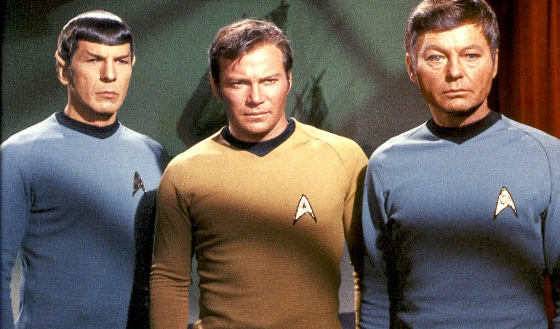 |
The most notable thing the new Star Trek continuity has done is make the characters younger. This is a continuity that features Kirk and Spock as youths (played by Chris Pine and Zachary Quinto), figuring out who they are and who they are to become. The last few movies may have leaned a little too hard on the destiny button, but that seems to be the job of any and all prequels these days (See: Gotham, Hannibal, Bates Motel, Smallville, The Carrie Diaries, The Young Indiana Jones Chronicles, Muppet Babies, and any number of prequel-based TV shows, including Star Trek: Enterprise).
I argue the following: Seeing Kirk and Spock become who they are is way, way less interesting than seeing them interact as the people they have become. Indeed, the dynamic of the original Star Trek was downright classical. It was a triangular character study. One one corner, you had Spock, dictated by emotionless logic and pure intellect. He was analytical. He was the mind. On another corner, you have Dr. McCoy, who reacts to everything emotionally. He is passionate, angry, sarcastic and very down-homey. He is suspicious of machinery and mechanical systems. He is nothing but empathy. He is the body. And between these two extremes, you had Kirk, the egalitarian ruler. Kirk is heroic, clear-headed, but also prone to fits of violence or sexual passion. He is compassionate, but knows when to be hard. He is the equalizer and the peacemaker between the mind and the body. He is the soul.
Id, ego, superego. Left, right, and center. It’s a formula all good Trekkies know about. So it’s a bit baffling that Abrams elected to abandon McCoy from this formula, and add… Uhura? Was she supposed to be the third in this equation? Actually, it was just a two-man play the way Abrams played it.
As director of Star Trek 3, I vow to bring the dynamic back. The three-man play that Star Trek has always kind of been. Later shows were more fully ensemble-based, but the original definitely had three main characters.
I’ll include everyone else, of course. And I’ll bring back Yeoman Rand.
4. I Understand the Technobabble
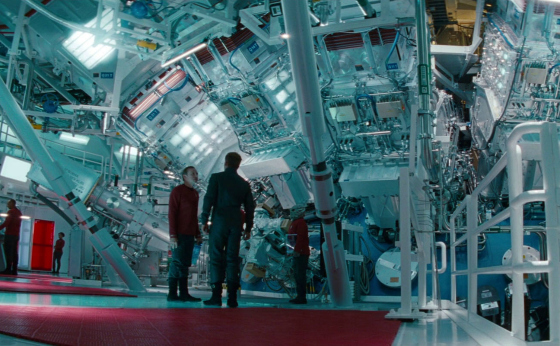 |
One of the most appealing aspects of Star Trek is how scientific it was. Well, more accurately, how scientific it sounded. When Next Generation was in production, the studio hired several technical consultants to ensure that the farfetched super-technology present on the show was somewhat based in actual physics. Star Trek knows how far it is between stars, and how fast someone would have to go to reach the next one over. Can warp engines really work? Probably not. But they at least acknowledge that a particular law of physics would need to be addressed.
This was one of the most glaring omissions from the first two Abrams films. The Enterprise sailed merrily from star to star without saying the word “lightyear” once. One lightyear, remember, is about 6 trillion miles. It’s important to have these tiny little details addressed in Star Trek. It’s what sets it apart from other sci-fi. It at least gestures toward actual hard science.
One should get a sense as to how the Enterprise actually works. All the scientific and technical details in the show made the ship more palpable, and gave fanboys a sense that they could – should they find themselves on the ship – pilot the Enterprise themselves. In my Star Trek movie, I will include as many details as I can, throw in multisyllabic techno-words, and make the Enterprise back into a living thing.
Seriously, I could probably find my way around the Enterprise-D. Should I find myself there.
5. I Understand the Theme
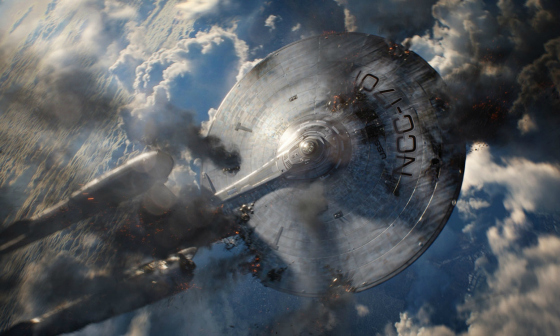 |
One of the reasons I cite Star Trek Into Darkness as the worst in the series is its overwhelming and disconcerting tone of fascism. Although the film plays lip service to peace and half-heartedly objects to missions of military revenge, it clearly wants to dive into combat. The uniforms are gray and militaristic. This is not a benevolent future. This is a future doomed to high-tech war and violence-led revenge.
And this, dear readers, is the very opposite of what Star Trek has always been. Star Trek‘s theme is deeply ingrained in my mind: It is an optimistic future. This is a world where smart people work their hardest to undo crises and help those in need. This is not about military conflict, but ethical conflict. The galaxy is not a scary place, but a fascinating one, where we may learn of other cultures and expand out character as a species. It’s telling that the ships featured on all the Star Trek shows are vessels of study, exploration, and diplomacy.
Star Trek 3 needs to be about study, exploration, and diplomacy. I propose that there by no “villain” this time. There should be a challenge, of course. Maybe a natural threat. Maybe an ethical quandary: save one planet or another? But it should not be – NOT be – about military conquest.
Save military conquest for the next Star Wars movie.
6. I Understand the Philosophy
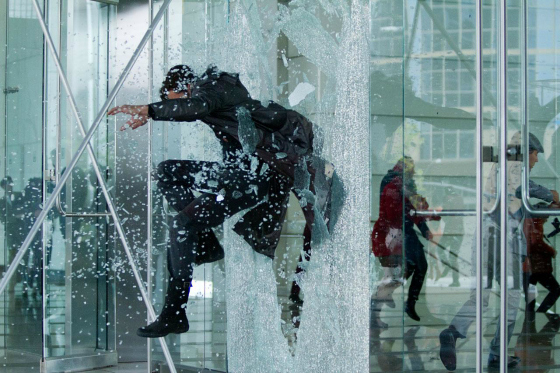 |
Star Trek always had a central philosophy as well. Beyond the themes of exploration, Star Trek represented unfettered optimism about the future. The future, Gene Roddenberry argued, was going to be a better place. War was over, racism was gone, and all inter-Earth conflicts had been resolved. Star Trek was about free love and world peace. In the new Star Trek films, the cynicism about technology and hate are back in full force, perhaps reflecting the cynicism and fear of the modern age. This is not the philosophy of Trek. At all.
My Star Trek film will take for granted that all petty conflicts have been solved. It will present the world of Star Trek as a benevolent place. Sure, there’s a Cold War with the Klingons, and we do have to start dealing with the repercussions of an entire planet being destroyed, but I would rather see people rising above and coming to peace with their demons rather than letting them out. Star Trek is about avoiding war. It’s about peace.
Sure, Deep Space Nine gave us a full-blown war, but that was a different kind of show, and that was 30 years and four series into Star Trek. This should be a placid time in Federation history. Star Trek 3 should be about how the Khan debacle forced the Federation to reconsider their thinking, and come back to their own principles. Indeed, how about sending the Enterprise out with limited weapons as a sign of goodwill? That way, we can focus on diplomacy and wit rather than violence.
There are no itchy phaser fingers in the future.
7. I’ll Undo That Goofy Love Story
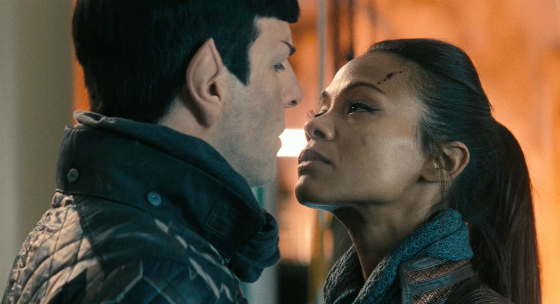 |
I hate the love story between Spock and Uhura. Like most people, I find it most illogical. Too many people get the wrong idea of Spock. Spock is most interesting when he’s maintaining his composure despite the temptation to thrash out emotionally. He’s not more interesting when he loses his cool and goes on a fistfighting rampage. And Spock, despite what some of my stranger female friends have said, would not make a keen boyfriend. He’s emotionless, and mates once every seven years. He’s not a dashing romantic lead.
Besides, what kind of weird-ass slash-fic was J.J. Abrams writing when he thought to romantically pair Spock and Uhura anyway? This was not something ever hinted at on the show, or in any of the previous movies. Indeed, romances between senior staff members was always seen as inappropriate. If you want to have a romance on Star Trek, it has to be unfulfilled. That is the plight of the starship crew. They cannot date their superiors.
So I’d write in a few lines of dialogue wherein the romance had come to an end. Maybe Uhura can talk about how dating Spock was not a good idea because he has no emotions to fulfill, and how being more adult and professional will be her beat from now on. Spock, meanwhile, can grow stronger and refuse to date anyone anymore, declaring that Vulcan principles of logic have taken charge once again. Let’s get back to the status quo, please, and try to put that silly romance idea behind us.
A better idea for a romance: Scotty and an Orion slave girl.
8. I’ll Bring Back the Vastness of Space
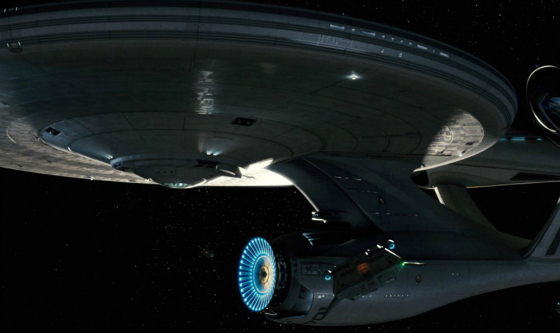 |
I mentioned above that the science of Star Trek was one of its most appealing facets. A ship traveling at warp 3 will only travel 4 light years in three days. Proxima Centauri, the closest star to our own Sun, is about 4 ? light years away. Space, Star Trek knows, is very, very, very, very big. It’s not just a medium through which our characters travel to get to the next scene like in Star Wars. It’s a long, empty vacuum that requires a lot of time and energy to traverse.
Space, Star Trek knows, is awesome. In the old sense of the word. At its best moments, Star Trek was able to really reach into the infinity of the unknown, and make our tiny ship feel like the speck it was in the vastness of the quiet cosmos. Some of the best Star Trek stories addressed this directly. What would happen, for instance, if the Enterprise was teleported to a far edge of the galaxy? It would take centuries to return to Earth. What unknown oddities would we discover? Would consciousness effect reality? Would evil thinking machines be lurking? What kind of unknowable things live out there in the unending blackness?
When one is able to warp to other planets, we need to remember that it is an astonishing feat. Sailing through the heavens is just as exhilarating as sailing the open sea, only multiplied by millions. The new Star Trek movies have gotten too intimate with space. It’s too easy to get from here to there. How about making Star Trek about, well, trekking? It could only improve things.
My Star Trek 3 will have a lot of scenes en route. Boring? Oh, no sir.
9. I Will Pay Homage Without Pandering
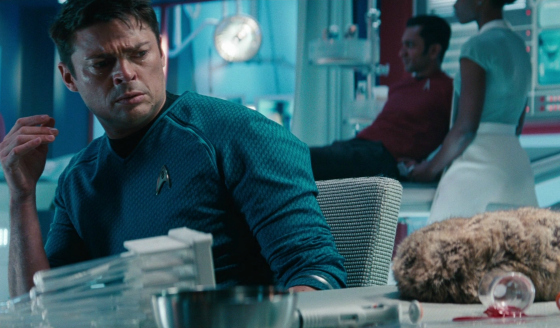 |
I hate hate hate the way Star Trek Into Darkness pandered to half-fans. Indeed, Abrams seems hellbent on hitting all the famous catchphrases of the original show, sure to highlight each one with a musical sting and a swirling close-up on a character’s intense face. Set phasers to stun. Most illogical. These are not moments designed to propel the drama, but to wink – or perhaps use semaphore flags to broadcast – familiar little fan moments. Into Darkness, with its whole Khan plot, was essentially a remake of Star Trek II: The Wrath of Khan, often quoting entire scenes almost word-for-word.
Star Trek‘s repeated phrases weren’t supposed to be catchphrases; They weren’t included to make the characters cool. Star Trek is not – NOT – about cool. Those phrases were repeated because they were just a regular part of the characters’ workday. Ahead warp factor 5. You don’t need to highlight every spoken order as if its a climax, Abrams. You can treat it naturally. Right?
In my Star Trek 3, I will most certainly include odd species and characters that fans may recognize (I mentioned Yeoman Rand already), but I will not make the plot all about the very fact that they appear. Here are some Tholians, and they are making a web. But they will only be an element of a larger story. I may include familiar bad guys, but the conflict will be new. If there is an antagonist, he will not come from a familiar place. I will keep the references in the background, rewarding the attentive without distracting anyone. Fan service is one thing, and it can be exhilarating. But at some point, you tip into pandering. Fans should not dictate the films.
Unless it’s me. I can dictate the films.
10. I’ll Listen to Notes
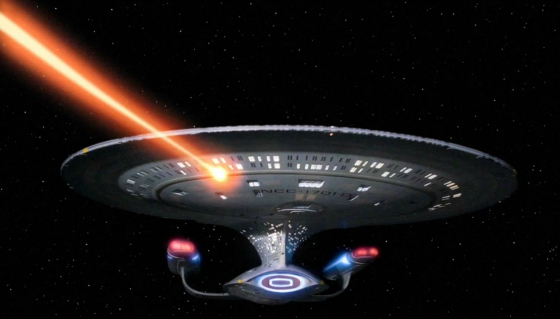 |
I may have a deep understanding of the way Star Trek functions, but I am no expert when it comes to directing a big budget film under the auspices of a major studio. As such, I promise to listen to and to entertain every note that you send me. If you want to talk casting, we will talk about it. I may be insistent on a few things, but when it comes to story or casting, I understand that you’ll want to have final say. I am under no illusions that I can pull the “But I’m an auteur!” card on you. Because I’m not. I’m inexperienced. Indeed, I will need your help to get through this.
My passion is strong and my opinions are staunch, but I will make an ideal director for the very reason that I am inexperienced. I will tell you what kind of film I want to make, and you will tell me what kind of film you want to make, and I will ensure that a happy medium be reached. Not an artistic or thematic or tonal compromise, but a happy medium. In fittingly Star Trek fashion, I will be diplomatic and egalitarian.
We want this to be a thoughtful movie, but don’t let me make it as slow-moving or as oblique as I want. That film would not be a hit. This is my plea of humility. I’m a know-it-all about Star Trek – I feel that I could make something better than what you’ve done – but I’m a know-nothing about filmmaking. I’ll be frank and open about what I want and what wouldn’t work, and I want you to be the same.
I play well with others.
11. No Lens Flare
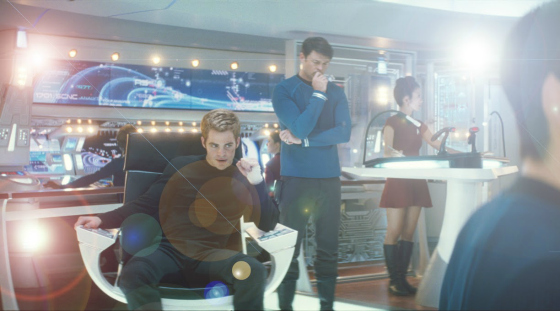 |
Everyone but J.J. Abrams hates that lens flare, and even he recently admitted that he used them too much in his Star Trek movies. The style has become a joke. A director’s quirk that people laugh pityingly at. I don’t really need to talk about it here. You know what’s what, dear readers.
I have no affection for lens flare. I will not use it. At all. Not once. I will clean up the visual clutter. I will make the lighting even and more workmanlike. Like a real starship might have. This is a workplace. A vessel full of people doing their jobs. Let’s not make it look like the interior of an Apple store with dying florescent bulbs.
Star Trek 3 will have a heftier camera, more restrained movements, and a solider visual palate. Let’s make it look more like a real movie. Heck, shoot on film if you can. Christopher Nolan can get away with it. Why can’t we?
12. I Could Use the Money
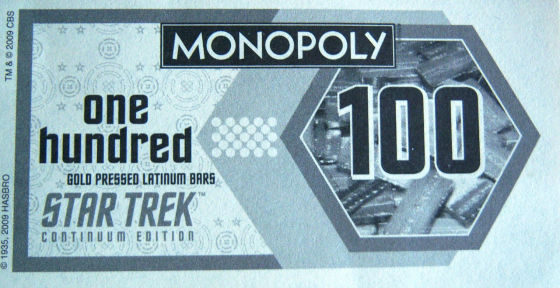 |
I’ve never had a gig this big. I sure could use the cash. I think this is a legit reason. And here’s the thing. As a first-timer, I’ll charge you way less than some celebrity director. Here’s my proposal: I will take exactly one tenth of what you paid J.J. Abrams.
Hire me, Paramount, and I will ensure that you make a film that is not only a big hit, but considered very, very good by critics and audiences alike. There’s only one logical choice here. Witney Seibold to direct.
Previously by Witney Seibold:
8 Reasons Video Games Will Never Make Good Movies
